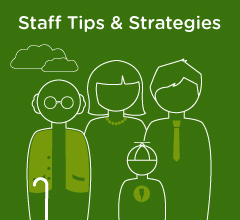Guiding Children from Meltdown to Mellowed

Author:
Deborah Goldstein, LCSW-C, Clinical Director
Preschool children are prone to “meltdowns,” or uncontrollable outbursts of emotion. Uncomfortable as they can be for the preschoolers and adults involved, meltdowns are normal in different populations of children, as these youngsters have yet to develop self-control and are easily overwhelmed by their emotions.
Various triggers can send a child into a meltdown. With limited language abilities and even more limited logical thinking, preschoolers can become easily frustrated when unable to communicate. Other triggers may include fatigue, hunger or a transition from one activity to another.
Here are some constructive ways for caregivers and parents to react:
- Keep calm. Take a deep breath. Try to avoid feeling emotionally flooded at the same time as the preschooler. If you also become upset, a battle with the child may result.
- Think about what your child needs from you at that moment. Needs may include empathy or a safe place to calm down. Soothing words such as “I see you are really upset,” which is a feeling the child cannot yet express verbally, may validate the experience. Physically placing yourself face-to-face with the child at his or her level as you speak can also help.
- Figure out your goals in the particular situation. You may react differently in public than at home. In a store, for example, be prepared to drop what you are doing and leave. At home, a time out to cool down may be an option. Some homes and daycares have a “calm-down corner” that is a safe and positive place for children to soothe themselves. A stuffed animal or other favorite object may also help the child self-soothe.
Though meltdowns often happen, parents and caregivers can learn to spot some warning signs. The child may start showing frustration or appear physically agitated. This is the time to calmly intervene and perhaps redirect or relocate the child to avoid emotional flooding.
In social-emotional development, self-regulation is an essential skill adults can teach a preschool child that will be critical for a lifetime. A proactive way adults can help a child learn is child-centered play, or play in which the child leads the way while adults observe and ask questions. Self-calming and self-control are the building blocks of healthy social-emotional development.
